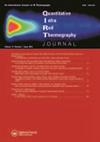On the use of pulsed thermography signal reconstruction based on linear support vector regression for carbon fiber reinforced polymer inspection
IF 4.9
3区 工程技术
Q1 INSTRUMENTS & INSTRUMENTATION
引用次数: 5
Abstract
ABSTRACT This study introduces and evaluates a new approach to reconstruct image sequences acquired during non-destructive testing by pulsed thermography. The proposed method consists of applying two linear support vector regressions to model the evolution of the data from both a spatial and temporal point of view. Each regression vectors will map the data with the number of pixels and the number of frames using convex optimisation. Then the regression vectors are used to predict a more robust representation of the data, thus reconstructing the sequence. The proposed method has been applied to data related to a reference sample of carbon reinforced fibre with known defects. This approach was evaluated on a sequence with severe non-uniform heating and was compared with state-of-the-art methods. Despite being sensitive to non-uniform heating, the proposed method provided a higher CNR score on smaller defects, compared with state-of-the-art methods. For the shallowest defects it shows better performance in term of contrast reconstruction compared to partial least-squares thermography (PLST). It also outperforms principal component thermography (PCT), and thermographic signal reconstruction-PCT (TSR-PCT) for defects located at a depth of 0.6 mm and 0.8 mm below the surface.基于线性支持向量回归的脉冲热成像信号重建在碳纤维增强聚合物检测中的应用
摘要本研究介绍并评估了一种通过脉冲热成像重建无损检测过程中获得的图像序列的新方法。所提出的方法包括应用两个线性支持向量回归,从空间和时间角度对数据的演变进行建模。每个回归向量将使用凸优化将数据与像素数量和帧数映射。然后使用回归向量来预测数据的更稳健的表示,从而重建序列。所提出的方法已应用于具有已知缺陷的碳增强纤维参考样品的相关数据。该方法在具有严重不均匀加热的序列上进行了评估,并与最先进的方法进行了比较。尽管该方法对不均匀加热很敏感,但与最先进的方法相比,该方法在较小的缺陷上提供了更高的CNR分数。对于最浅的缺陷,与偏最小二乘热成像(PLST)相比,它在对比度重建方面表现出更好的性能。对于位于表面以下0.6mm和0.8mm深度的缺陷,它还优于主成分热成像(PCT)和热成像信号重建PCT(TSR-PCT)。
本文章由计算机程序翻译,如有差异,请以英文原文为准。
求助全文
约1分钟内获得全文
求助全文
来源期刊

Quantitative Infrared Thermography Journal
Physics and Astronomy-Instrumentation
CiteScore
6.80
自引率
12.00%
发文量
17
审稿时长
>12 weeks
期刊介绍:
The Quantitative InfraRed Thermography Journal (QIRT) provides a forum for industry and academia to discuss the latest developments of instrumentation, theoretical and experimental practices, data reduction, and image processing related to infrared thermography.
 求助内容:
求助内容: 应助结果提醒方式:
应助结果提醒方式:


